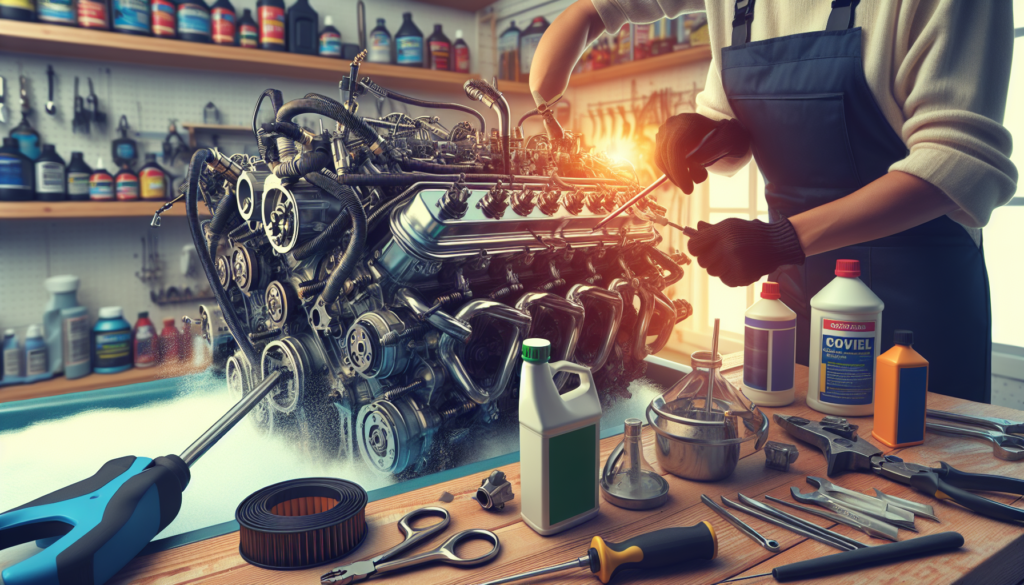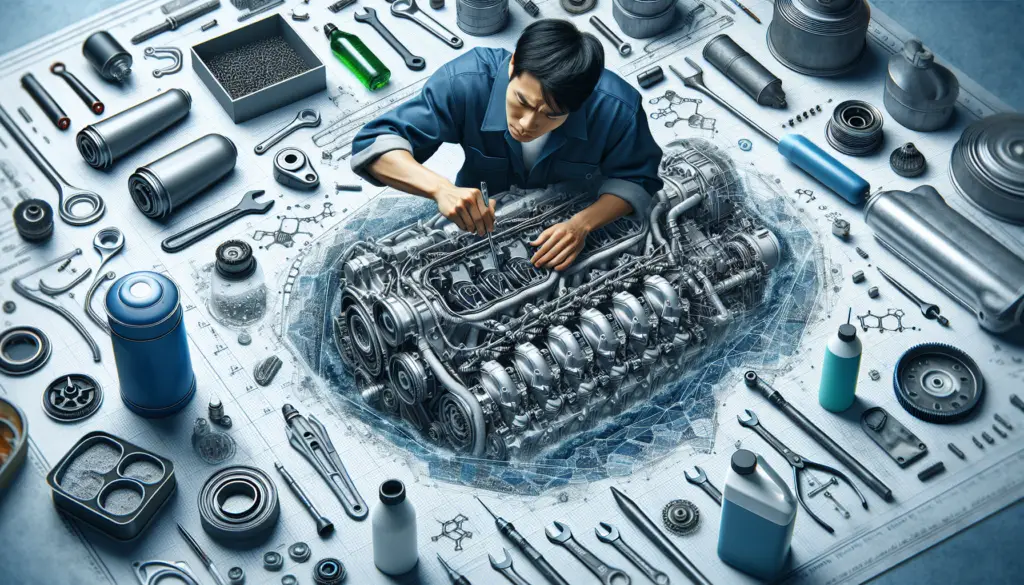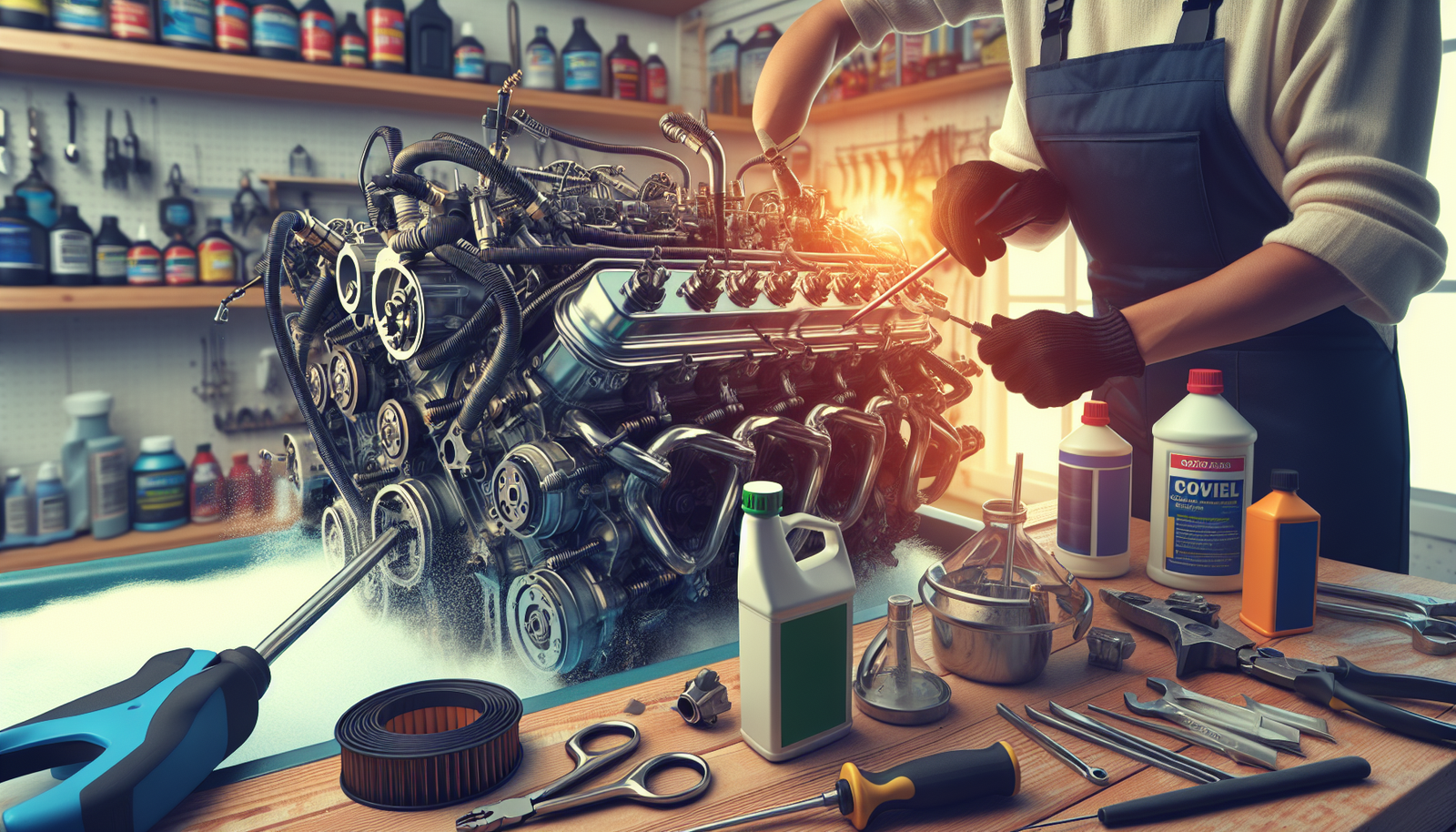As a boat owner, protecting your precious vessel’s engine should always be on top of your priority list. One particular concern is the damaging effects of ethanol fuel. Fortunately, the article, “The Best Ways To Protect Your Boat Engine From The Effects Of Ethanol Fuel”, presents a wealth of strategies to safeguard your engine and ensure it runs smoothly for years to come. This information-packed guide thoroughly offers ways to mitigate ethanol’s destructive impact and maximize your engine’s performance.

Understanding the effect of ethanol on boat engines
When discussing fuel options for boat engines, it’s important to understand the role that ethanol can play. A common component in most types of gasoline, ethanol is a kind of alcohol that is derived from plant materials. It’s renowned for its effectiveness in reducing greenhouse gas emissions, which is why it’s frequently added to gasoline. However, while it may play a critical role in combatting global warming, it can cause issues when it comes to boat engines.
The chemical properties of ethanol
Ethanol is a clear and colorless liquid that can absorb water. It is polar, meaning it can easily mix with water, but it doesn’t mix so well with materials that are nonpolar. This capacity to bind with water is where the trouble starts when it’s introduced to boat engines due to the tendency for water to accumulate in boats.
Why ethanol is problematic for boat engines
Due to its hygroscopic nature, ethanol can attract moisture from the environment, leading to an accumulated water-ethanol mixture inside your fuel tank. This can subsequently lead to phase separation, where water and fuel become distinct layers that can interfere with the overall functioning of your engine. Additionally, ethanol can act as a solvent that can loosen dirt, debris, and rust in the tank and fuel system, causing clogs and even engine failure.
Signs of ethanol damage in boat engines
Ethanol damage in boat engines can manifest in numerous ways, which include erratic engine performance, poor acceleration, and unexpected engine shutdown. The presence of excessive water or sediment in the boat’s fuel filter can also hint towards ethanol damage.
Regular engine maintenance
Proper maintenance is the key to a healthy boat engine. Consistent care can make a massive difference in the overall performance and lifespan of your boat’s engine.
The importance of frequent oil changes
Fresh oil improves the lubrication of the engine parts, reducing wear and tear and keeping your engine running smoothly. Contaminated oil can compromise engine performance, so regular oil changes are crucial in preventing any damage.
Effectively cleaning the engine
Keeping the engine clean can drastically reduce the risk of ethanol damage. Regular cleaning reduces the presence of dirt and sludge that can affect the performance of the engine and exacerbate the effects of ethanol.
Checking the hull for water and ethanol mixtures
Regular checks for water and ethanol mixtures in your boat’s hull can help prevent ethanol from finding its way into your engine. Keeping the hull clean and dry is an effective way to avoid the harms caused by ethanol.
Replacing parts affected by ethanol damage
It is essential to replace the affected parts to prevent the spread of ethanol damage throughout the engine. Routine checks can identify any parts that need replacing before they cause significant harm.
Using ethanol-free fuel alternatives
One way to prevent ethanol damage is to use ethanol-free fuel alternatives. This not only circumvents the problems rooted in ethanol use but also comes with other advantages.
Advantages of ethanol-free fuel
Using ethanol-free fuel can provide better fuel efficiency and performance for your boat engine, as it lacks the components causing phase separation and acting as solvent. It also decreases potential harm to the engine parts and extends their longevity.
Possible types of ethanol-free fuels
There are several types of ethanol-free fuels available, such as straight gasoline or aviation fuel. However, availability may vary by location and you should take into consideration the manufacturer’s specifications before opting for a particular fuel type.
Accessibility and price comparison with ethanol fuels
While ethanol-free fuels generally cost more than ethanol blends, the increased price is often offset by the higher fuel economy and the costs saved on repairs and replacement parts.
Installing a water separator and fuel filter
Combating the threat of ethanol in your boat’s fuel system involves installing tools like water separators and fuel filters.
Function of a water separator
A water separator is a device that separates water from your boat’s fuel. Since ethanol pulls water into the fuel, a separator can mitigate the effects of ethanol-based damage by removing water before it reaches the engine.
Advantages of a fuel filter
A fuel filter eliminates impurities from the fuel before it is consumed by the engine. It plays a key role in increasing engine life and improving its performance by preventing harmful particles from entering the engine.
Step by step installation guide
While the installation steps might vary depending on the model, the basic process involves selecting the right location, preparing the site, attaching the necessary brackets and lines, and finally, proper fitting of the separator or fuel filter.

Using fuel additives
Incorporating fuel additives into your boat engine maintenance regimen can help alleviate problems associated with ethanol.
Understanding fuel additives
Fuel additives optimize fuel efficiency, decrease emissions, and improve overall engine performance. They can be ethanol-compatible and are capable of neutralizing the damaging impacts that ethanol can have on your boat engine.
Benefits of using fuel additives
Fuel additives can absorb water and prevent phase separation caused by ethanol. They can also protect your engine’s components from the corrosive effects of ethanol, thus enhancing its durability and performance.
How to choose the right fuel additive
In order to choose the best fuel additive, you should go for one designed for boating and suitable for ethanol-blended fuels. It’s also essential to understand your specific needs and performance expectations.
Regular fuel system checks
Regularly inspecting your boat’s fuel system is another way to protect it from ethanol damage.
Significance of fuel system checks
Routine fuel system checks can help identify signs of damage or wear that may lead to bigger, costly issues down the line. These checks can detect ethanol damage in its early stages and allow you to take mitigating measures promptly.
Warning signs of a faulty fuel system
Tell-tale signs of a faulty fuel system can be a stalling engine, a drop in boat speed, difficulty in starting the engine, and poor fuel economy. If your boat shows any of these symptoms, it might be time to check your fuel system.
Repairing or replacing components of the fuel system
Depending on the severity of the problem, you might need to either repair or replace parts of your fuel system. To avoid costly repairs, it’s always best to maintain your fuel system regularly to avoid ethanol damage.
Ethanol-proofing your fuel tank
Making your fuel tank resistant to ethanol can be an effective way of protecting your boat engine.
What does it mean to make a fuel tank ethanol-proof
Ethanol-proofing your fuel tank means modifying it to prevent the corrosive and detrimental effects of ethanol. This can be done by using ethanol-compatible materials and protective coatings.
Methods to ethanol-proof your fuel tank
Coating the inner surface of your fuel tank with a fuel-resistant epoxy resin is one way to ethanol-proof it. You could also replace parts of your fuel system with materials that are resistant to ethanol, such as stainless steel and some plastics.
Long-term benefits of an ethanol-proof fuel tank
An ethanol-proof fuel tank can withstand the damage caused by ethanol and reduce ongoing costs related to engine maintenance and repairs. This significantly enhances the longevity and performance of your boat engine.
Storing your boat correctly
The way you store your boat when it’s not in use can also influence the effects of ethanol on its engine.
Impact of proper storage on boat engine longevity
Proper storage ensures the engine is protected from undesirable elements such as excess moisture which ethanol can draw in. This can help prevent damage, increasing the engine’s lifespan and reliability.
Storage do’s and don’ts
Remember to store your boat in a dry and covered location, away from the elements. Always use a breathable boat cover to prevent condensation. Filling the tank with fuel and adding a stabilizer can help prevent ethanol damage while in storage.
The role of ethanol in boat storage issues
When your boat is in storage, ethanol can continue attracting water, leading to phase separation and possible engine damage. Preventative measures during storage need to be followed to avoid these issues.
Replacing engine parts regularly
Timely replacement of engine parts is another way to prevent deteriorating effects of ethanol.
The link between part durability and ethanol damage
Ethanol can speed up the wear and tear process of some engine parts, potentially leading to breakdowns. Regular replacement of these parts can prevent damage from becoming serious.
Identifying parts that need replacement
Regular inspections can help you spot parts that are wearing out or being damaged by ethanol. Common parts to keep an eye on include hoses, gaskets, and seals, as they are more vulnerable to ethanol damage.
Cost-benefit analysis of regular part replacement
Though replacing engine parts costs money upfront, it could save you a lot more in the long run by preventing extensive engine damage and costly repairs.
Investing in a quality fuel system
Last but not least, a high-quality fuel system can offer better protection against ethanol damage.
Benefits of a high-quality fuel system
A quality fuel system that’s designed to be resilient to ethanol can lead to improved engine performance, lower maintenance needs, and enhanced longevity of your engine parts.
How to choose a reliable fuel system
While selecting a fuel system, opt for one that’s specifically designed for harsh maritime conditions. It should be compatible with your particular engine type, and ideally, be resistant to ethanol.
Maintenance requirements of a quality fuel system
Although a high-quality fuel system requires less maintenance, it’s always a good idea to conduct regular checks and cleanings to ensure everything is operating as it should. Remember, proactive care is always cheaper and more effective than reactive repairs.
In summary, protecting your boat engine from the effects of ethanol may involve a multifaceted approach. This can include regular engine maintenance, utilizing ethanol-free fuel alternatives, installation of filters and separators, using fuel additives, frequent fuel system checks, ethanol-proofing your fuel tank, proper storage practices, regular part replacements, and investing in a quality fuel system. With the right care and preventative measures, you can enjoy a smoother and more reliable boating experience.


[…] keeping the engine clean, using the recommended oil and fuel types, and being diligent about pre- and post-use checks are all part of the care package for engines. […]
[…] Knowing how your boat engine operates is crucial. It’s not just about getting from point A to point B; the heart of your boat – the engine, affects everything from speed and power to fuel efficiency. […]
[…] create troublesome waves in this idyllic scenario. In the article ‘What Are The Best Ways To protect your boat engine From Water Damage?’, you’ll find essential tips and methods to guard your boat engine […]